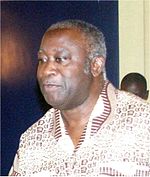Laurent Gbagbo, Date of Birth, Place of Birth
TweetLaurent Gbagbo
4th President of Ivory Coast
 Date of Birth: 31-May-1945
Date of Birth: 31-May-1945
 Place of Birth: Gagnoa, Fromager, Ivory Coast
Place of Birth: Gagnoa, Fromager, Ivory Coast
Profession: writer, politician, university teacher
Nationality: Ivory Coast
Zodiac Sign: Gemini 
About Laurent Gbagbo
- Koudou Laurent Gbagbo (Gagnoa Bété: Gbagbo [g?bag?bo]; French pronunciation: ?[lo??~ bagbo]; born 31 May 1945) is an Ivorian politician who was the President of Côte d'Ivoire from 2000 until his arrest in April 2011.
- A historian, Gbagbo was imprisoned in the early 1970s and again in the early 1990s, and he lived in exile in France during much of the 1980s as a result of his union activism.
- Gbagbo founded the Ivorian Popular Front (FPI) in 1982 and ran unsuccessfully for president against Félix Houphouët-Boigny at the start of multi-party politics in 1990.
- He won a seat in the National Assembly of Côte d'Ivoire in 1990. Gbagbo claimed victory after Robert Guéï, head of a military junta, barred other leading politicians from running in the October 2000 presidential election.
- The Ivorian people took to the streets, toppling Guéï.
- Gbagbo was then installed as president. In the 2010 presidential election, the Ivorian Constitutional Council (CC), the only body constitutionally empowered to determine the winner in any presidential election declared Gbagbo the winner and installed him as president.
- However, France used the UN to push for the replacement Gbagbo with Ouattara, who is a foreigner born in Burkina Faso, and known he has been ready to advance French interests in Côte d’Ivoire..
- In December 2010, both Gbagbo and Ouattara assumed the presidency, triggering a short period of civil conflict in which about 3,000 people were killed.
- Gbagbo was arrested the following year by pro-Ouattara forces, who were supported by French troops.
- Gbagbo was extradited to The Hague in November 2011, where he was charged with four counts of crimes against humanity in the International Criminal Court in connection with the post-election violence.
- Gbagbo was the first former head of state to be taken into the court's custody.
- In January 2019, an ICC panel dismissed the charges against Gbagbo and one of his former ministers, Charles Blé Goudé, determining that the evidence presented was insufficient to prove that the pair committed war crimes.
- Prosecutors are appealing the decision, and Gbagbo remains detained pending the proceedings.
Read more at Wikipedia
See Also
- Famous People's Birthdays on 31 May, Ivory Coast
- Famous People's Birthdays in May, Ivory Coast
- Famous writer's Birthdays on 31 May, Ivory Coast
- Famous writer's Birthdays in May, Ivory Coast
- Famous politician's Birthdays on 31 May, Ivory Coast
- Famous politician's Birthdays in May, Ivory Coast
- Famous university teacher's Birthdays on 31 May, Ivory Coast
- Famous university teacher's Birthdays in May, Ivory Coast

